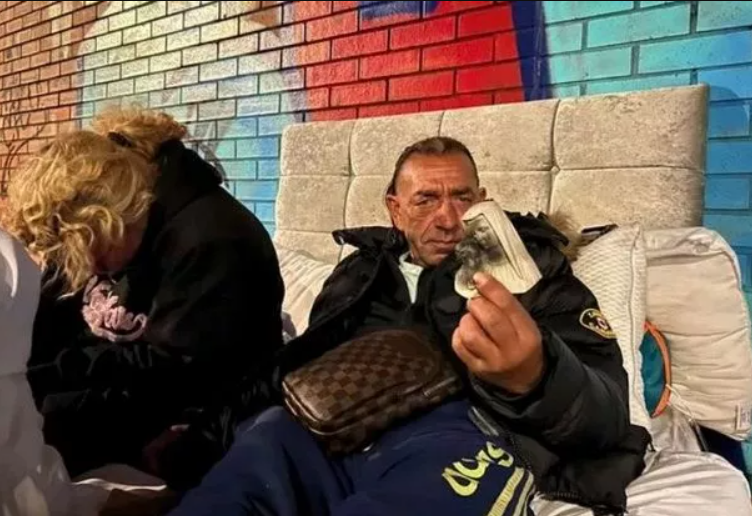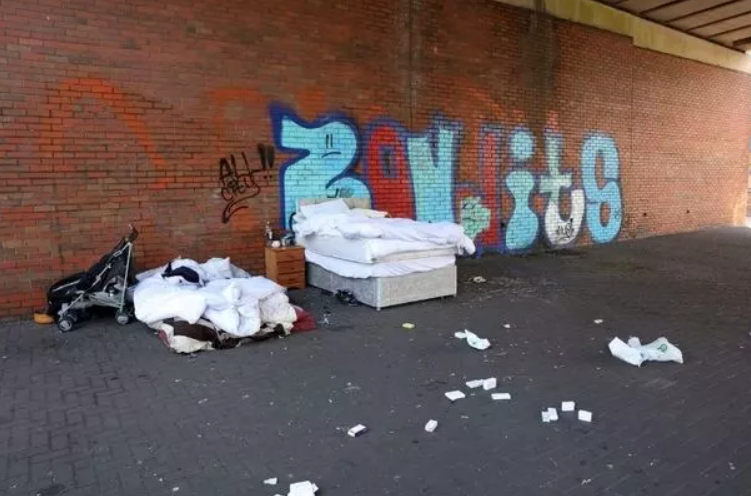Couple Expecting First Child Compelled to Live by Bustling City Roundabout After Council Refused To Give Them Home

A Czech couple, despite expecting their first child, has been found residing near a roundabout in Cardiff after the expectant mother was recently evicted from her hostel accommodation.
Ladislav Boldezersky and his partner Nada Venglarova, a homeless couple from the Czech Republic, are living near a graffiti-covered roundabout in Cardiff, under the A4234 Central Link flyover.

Their makeshift home includes a bed, cooking pot, water and milk bottles, and a bedside cabinet. The couple, together for five years, are anticipating the arrival of their child in four months and already have a pram prepared for the baby.
Ladislav, 56, and Nada, 43, were evicted from Cardiff Council’s Ty Ephraim hostel approximately six weeks ago because Nada lacks a passport. While Ladislav is eligible for council services, Nada is not, due to her lack of residency rights in the UK. During the Covid pandemic, Nada was permitted to stay in the hostel for two years, but recently she was asked to leave. Despite the council being unaware of her pregnancy, they indicated that Nada could return under “exceptional circumstances.” Additionally, she is receiving support from a charity as she applies for citizenship and will be allowed to stay with Ladislav during this process.
The situation is incredibly challenging for the couple. Ladislav, who recently lost the wheelchair he needs for mobility, now relies heavily on Nada. He has lived in Cardiff for 20 years and was previously a chef at a Pakistani restaurant until it closed a decade ago. Since then, he has not worked and has struggled with alcohol dependency, exacerbated by severe back pain.
Ladislav has contemplated suicide but cites his partner and unborn child as his reason for continuing. He also faces difficulties understanding his medication for severe depression.
A letter from his GP to Ty Ephraim hostel on July 1 states: “Mr. Boldezersky has a significant history of depression and anxiety, for which he takes regular medication. His current living conditions are severely impacting his mental health, and he believes that more stable accommodation would greatly benefit him. He fears that his mental health will deteriorate further if the situation does not improve.”
Regarding their safety, another homeless person sleeps nearby, with whom they are friends. However, they worry about conflicts with others in the area, as some individuals have caused trouble for them.

“We are going to try to get a passport for Nada,” Ladislav said. “We are worried about what will happen if we are still homeless when the child is born. We might have to leave Wales. There are no jobs, no money, no support. For my baby, I am worried.”
In Cardiff, approximately 858 individuals have reported being homeless since January this year, with around 596 at risk of becoming homeless. Robin White of Shelter Cymru responded to these figures by emphasizing the need for immediate, medium, and long-term actions, including ending no-fault evictions, ensuring the welfare system effectively prevents homelessness, and increasing the supply of affordable social housing.




